Hexagramme 60 du Yi Jing - Trait 5
L'hexagramme : 60
Un hexagramme est une combinaison de six traits yin et yang.

60.5 (60 > 19) - THE KIEH HEXAGRAM.
The fifth line, undivided, shows its subject sweetly and acceptably enacting his regulations. There will be good fortune. The onward progress with them will afford ground for admiration.
Bing DeepL Google Yandex60.5 (60 > 19) - Doing one' s best without help
One discovers alone a new way of doing what is necessary, so one is recognised.
Bing DeepL Google Yandex60.5 (60 > 19) - Doing one' s best without help
One discovers alone a new way of doing what is necessary, so one is recognized.
Bing DeepL Google Yandex60.5 (60 > 19) - Tsieh, la délimitation
Tsieh : règle, loi, mesure.
Appliquer doucement les lois est une condition de prospérité. En procédant ainsi, on se rendra illustre ; [car on remplit alors ses fonctions parfaitement.]
Bing DeepL Google Yandex60.5 (60 > 19) - Faire de son mieux sans aide
On découvre seul une nouvelle manière de faire le nécessaire, alors on est reconnu.
Bing DeepL Google Yandex60.5 (60 > 19) - Korlátozás
Segítség nélkül felfedez egy új utat hogy megoldja a szükségest, így elismerést kap.
Bing DeepL Google YandexLes trigrammes
Les trigrammes sont des combinaisons de trois traits yin et yang. Dans l'hexagramme, les trois traits du dessous constituent le trigramme inférieur et représentent la situation intérieure. Les trois lignes du haut constituent le trigramme supérieur et représentent la situation extérieure.
trigSup2


trigInf

L'hexagramme nucléaire : 27.6 (27 > 24)
L'hexagramme nucléaire est l'association des deux trigrammes intérieurs (traits 2,3,4 et 3,4,5). Il représente la racine, ou l'origine de la situation.

27.6 (27 > 24) - THE Î HEXAGRAM.
The sixth line, undivided, shows him from whom comes the nourishing. His position is perilous, but there will be good fortune. It will be advantageous to cross the great stream.
Bing DeepL Google Yandex27.6 (27 > 24) - Distributing
One gives others what they ask for after having gone to fetch it
Bing DeepL Google Yandex27.6 (27 > 24) - Distributing
One gives others what they ask for after having gone to fetch it
Bing DeepL Google Yandex27.6 (27 > 24) - I, l’alimentation
Ī : 1. Entretenir, soutenir ; 2. Menton, côté de la bouche ; 3. Profond.
Rechercher les moyens d’entretenir les hommes est une excellente chose quoique difficile ; elle réussira avantageusement (si l’on s’y applique).
On en retirera l’approbation universelle.
27.6 (27 > 24) - Distribuer
On donne aux autres ce qu'ils demandent après avoir été le chercher.
Bing DeepL Google YandexLe dérivé (Fan Yao) : 19.5
Le même trait sur l'hexagramme après la mutation. Il représente ce qui peut être fait APRÈS pour corriger la situation décrite par ce trait, un peu comme un remède ou une solution.

19.5 (19 > 60) - THE LIN HEXAGRAM.
The fifth line, divided, shows the advance of wisdom, such as befits the great ruler. There will be good fortune.
Bing DeepL Google Yandex19.5 (19 > 60) - No longer being in line with the others
One does not return because they do not want to be abused again.
Bing DeepL Google Yandex19.5 (19 > 60) - No longer being in line with the others
One does not return because they do not want to be abused again.
Bing DeepL Google Yandex19.5 (19 > 60) - Lin, l’approche
Lin : autorité, surintendance, fonction.
Savoir bien exercer l’autorité est nécessaire au grand prince et chose très heureuse.
Le prince doit suivre la voie du milieu.
19.5 (19 > 60) - Ne plus être en phase avec les autres
On ne revient pas car on ne veut plus subir d'agressions.
Bing DeepL Google YandexLa jointure: 20.2
Le dérivé du réciproque. Il représente ce qui aurait pu être fait AVANT pour prévenir la situation décrite par ce trait, un peu comme un remède ou une solution.

20.2 (20 > 59) - THE KWÂN HEXAGRAM.
The second line, divided, shows one peeping out from a door. It would be advantageous if it were (merely) the firm correctness of a female.
Bing DeepL Google Yandex20.2 (20 > 59) - Not just sitting back and watch
One should help one's kind rather than looking at them.
Bing DeepL Google Yandex20.2 (20 > 59) - Not just sitting back and watch
One should help one's kind rather than looking at them.
Bing DeepL Google Yandex20.2 (20 > 59) - Kwèn, la contemplation
Kwèn : 1. Regarder, contempler, regard ; 2. Apparence extérieure, maintien ; 3. Gravité, dignité.
Regarder, épier d’une porte entrouverte ; ce qui est bon pour une femme. Mais cela peut attirer la honte.
Regarder une femme, d’une porte ouverte.
20.2 (20 > 59) - Ne pas rester les bras croisés
On devrait aider les siens au lieu de les regarder faire.
Bing DeepL Google Yandex20.2 (20 > 59) - Tekintet
Tudnia kéne segítenie az övéinek, ahelyett hogy csak nézi őket.
Bing DeepL Google YandexLe réciproque : 59.2
L'hexagramme renversé. Il représente la situation opposée, et en tant que tel est essentiel pour la validation des commentaires.

59.2 (59 > 20) - THE HWÂN HEXAGRAM.
The second line, undivided, shows its subject, amid the dispersion, hurrying to his contrivance (for security). All occasion for repentance will disappear.
Bing DeepL Google Yandex59.2 (59 > 20) - Making others become aware of their shortcomings
One asks one's relatives to watch the mess they have caused.
Bing DeepL Google Yandex59.2 (59 > 20) - Making others become aware of their shortcomings
One asks one's relatives to watch the mess they have caused.
Bing DeepL Google Yandex59.2 (59 > 20) - Hwán, la dissolution
Hwán : extension, exposition, développement, abondance débordante ; dispersion, dissipation.
Si, dans cet état dangereux, on se retire précipitamment dans l’obscurité, on n’aura pas à s’en repentir [on arrivera au but de son désir, le rétablissement de l’ordre et l’union.] ou : dans l’état de discorde, il faut se retirer dans l’obscurité.
Bing DeepL Google Yandex59.2 (59 > 20) - Faire prendre conscience aux autres de leurs manquements
On demande à ses proches de regarder le désordre qu'ils ont causé.
Bing DeepL Google Yandex59.2 (59 > 20) - Elválasztás
Kéri a közelállóit hogy nézzék meg a rendetlenséget amit okoztak.
Bing DeepL Google YandexMutations

60.5 (60 > 19) - THE KIEH HEXAGRAM.
The fifth line, undivided, shows its subject sweetly and acceptably enacting his regulations. There will be good fortune. The onward progress with them will afford ground for admiration.
Bing DeepL Google Yandex60.5 (60 > 19) - Doing one' s best without help
One discovers alone a new way of doing what is necessary, so one is recognised.
Bing DeepL Google Yandex60.5 (60 > 19) - Doing one' s best without help
One discovers alone a new way of doing what is necessary, so one is recognized.
Bing DeepL Google Yandex60.5 (60 > 19) - Tsieh, la délimitation
Tsieh : règle, loi, mesure.
Appliquer doucement les lois est une condition de prospérité. En procédant ainsi, on se rendra illustre ; [car on remplit alors ses fonctions parfaitement.]
Bing DeepL Google Yandex60.5 (60 > 19) - Faire de son mieux sans aide
On découvre seul une nouvelle manière de faire le nécessaire, alors on est reconnu.
Bing DeepL Google Yandex60.5 (60 > 19) - Korlátozás
Segítség nélkül felfedez egy új utat hogy megoldja a szükségest, így elismerést kap.
Bing DeepL Google Yandex
60.1.5 (60 > 7) - THE KIEH HEXAGRAM.
- 1. The first line, undivided, shows its subject not quitting the courtyard outside his door. There will be no error.
- 5. The fifth line, undivided, shows its subject sweetly and acceptably enacting his regulations. There will be good fortune. The onward progress with them will afford ground for admiration.
60.1.5 (60 > 7) - The limit
One mentions facts that one will regret having talked about.
Bing DeepL Google Yandex60.1.5 (60 > 7) - The limit
One mentions facts that one will regret having talked about.
Bing DeepL Google Yandex60.1.5 (60 > 7) - Tsieh, la délimitation
Tsieh : règle, loi, mesure.
-
1. Tel ne sort pas de la porte extérieure de son habitation et n’en a point de regret.
(Dès qu’il voit tout ce qui se passe chez lui, il peut tout y bien gouverner.) Quand on sait qu’il y a lieu de ne pas sortir ou bien empêchement. - 5. Appliquer doucement les lois est une condition de prospérité. En procédant ainsi, on se rendra illustre ; [car on remplit alors ses fonctions parfaitement.]
60.1.5 (60 > 7) - La limite
On évoque des faits dont on regrettera avoir parlé.
Bing DeepL Google Yandex60.1.5 (60 > 7) - Korlátozás
- 1. Nem gyötri saját magát tovább miközben várja hogy visszatérjenek a barátai.
- 5. Segítség nélkül felfedez egy új utat hogy megoldja a szükségest, így elismerést kap.

60.2.5 (60 > 24) - THE KIEH HEXAGRAM.
- 2. The second line, undivided, shows its subject not quitting the courtyard inside his gate. There will be evil.
- 5. The fifth line, undivided, shows its subject sweetly and acceptably enacting his regulations. There will be good fortune. The onward progress with them will afford ground for admiration.
60.2.5 (60 > 24) - The limit
One approves a method that has the advantage of being easier to implement.
Bing DeepL Google Yandex60.2.5 (60 > 24) - The limit
One approves a method that has the advantage of being easier to implement.
Bing DeepL Google Yandex60.2.5 (60 > 24) - Tsieh, la délimitation
Tsieh : règle, loi, mesure.
-
2. Mais s’il ne passe pas la porte intérieure de la maison (celle du quartier intérieur, du quartier des femmes), il éprouvera les mauvais effets de cette conduite. (Ne voyant que partiellement ce qui se passe chez lui, il pourra lui arriver des désagréments.)
Il manquera le point de temps extrême pour faire le nécessaire selon les circonstances. - 5. Appliquer doucement les lois est une condition de prospérité. En procédant ainsi, on se rendra illustre ; [car on remplit alors ses fonctions parfaitement.]
60.2.5 (60 > 24) - La limite
On approuve une méthode qui présente l'avantage d'être plus facile à mettre en œuvre.
Bing DeepL Google Yandex60.2.5 (60 > 24) - Korlátozás
- 2. Elrejti a bizonytalanságokat hogy uralja a helyzetet.
- 5. Segítség nélkül felfedez egy új utat hogy megoldja a szükségest, így elismerést kap.
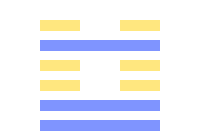
60.1.2.5 (60 > 2) - THE KIEH HEXAGRAM.
- 1. The first line, undivided, shows its subject not quitting the courtyard outside his door. There will be no error.
- 2. The second line, undivided, shows its subject not quitting the courtyard inside his gate. There will be evil.
- 5. The fifth line, undivided, shows its subject sweetly and acceptably enacting his regulations. There will be good fortune. The onward progress with them will afford ground for admiration.
60.1.2.5 (60 > 2) - The limit
One knows the exact moment when it will be necessary to act.
Bing DeepL Google Yandex60.1.2.5 (60 > 2) - The limit
One knows the exact moment when it will be necessary to act.
Bing DeepL Google Yandex60.1.2.5 (60 > 2) - Tsieh, la délimitation
Tsieh : règle, loi, mesure.
-
1. Tel ne sort pas de la porte extérieure de son habitation et n’en a point de regret.
(Dès qu’il voit tout ce qui se passe chez lui, il peut tout y bien gouverner.) Quand on sait qu’il y a lieu de ne pas sortir ou bien empêchement. -
2. Mais s’il ne passe pas la porte intérieure de la maison (celle du quartier intérieur, du quartier des femmes), il éprouvera les mauvais effets de cette conduite. (Ne voyant que partiellement ce qui se passe chez lui, il pourra lui arriver des désagréments.)
Il manquera le point de temps extrême pour faire le nécessaire selon les circonstances. - 5. Appliquer doucement les lois est une condition de prospérité. En procédant ainsi, on se rendra illustre ; [car on remplit alors ses fonctions parfaitement.]
60.1.2.5 (60 > 2) - La limite
On connaît le moment précis où il faudra agir.
Bing DeepL Google Yandex60.1.2.5 (60 > 2) - Korlátozás
- 1. Nem gyötri saját magát tovább miközben várja hogy visszatérjenek a barátai.
- 2. Elrejti a bizonytalanságokat hogy uralja a helyzetet.
- 5. Segítség nélkül felfedez egy új utat hogy megoldja a szükségest, így elismerést kap.

60.3.5 (60 > 11) - THE KIEH HEXAGRAM.
- 3. The third line, divided, shows its subject with no appearance of observing the (proper) regulations, in which case we shall see him lamenting. But there will be no one to blame (but himself).
- 5. The fifth line, undivided, shows its subject sweetly and acceptably enacting his regulations. There will be good fortune. The onward progress with them will afford ground for admiration.
60.3.5 (60 > 11) - The limit
One replaces those who are fond of doing nothing without having been solicited.
Bing DeepL Google Yandex60.3.5 (60 > 11) - The limit
One replaces those who are fond of doing nothing without having been solicited.
Bing DeepL Google Yandex60.3.5 (60 > 11) - Tsieh, la délimitation
Tsieh : règle, loi, mesure.
- 3. Qui n’observe pas les lois s’en repentira suffisamment par la suite et se lamentera sans que personne ait besoin de le blâmer. (Ou bien : s’en repentira si amèrement que personne n’aura le courage de le blâmer.)
- 5. Appliquer doucement les lois est une condition de prospérité. En procédant ainsi, on se rendra illustre ; [car on remplit alors ses fonctions parfaitement.]
60.3.5 (60 > 11) - La limite
On remplace ceux qui se plaisent à ne rien faire sans avoir été sollicités.
Bing DeepL Google Yandex60.3.5 (60 > 11) - Korlátozás
- 3. Túl gyenge hogy táplálja a csoportját így felkészül hogy felszámolja a függőségüket.
- 5. Segítség nélkül felfedez egy új utat hogy megoldja a szükségest, így elismerést kap.

60.1.3.5 (60 > 46) - THE KIEH HEXAGRAM.
- 1. The first line, undivided, shows its subject not quitting the courtyard outside his door. There will be no error.
- 3. The third line, divided, shows its subject with no appearance of observing the (proper) regulations, in which case we shall see him lamenting. But there will be no one to blame (but himself).
- 5. The fifth line, undivided, shows its subject sweetly and acceptably enacting his regulations. There will be good fortune. The onward progress with them will afford ground for admiration.
60.1.3.5 (60 > 46) - Thinking oneself superior to others
One patronises modest people.
Bing DeepL Google Yandex60.1.3.5 (60 > 46) - Thinking oneself superior to others
One patronizes modest people.
Bing DeepL Google Yandex60.1.3.5 (60 > 46) - Tsieh, la délimitation
Tsieh : règle, loi, mesure.
-
1. Tel ne sort pas de la porte extérieure de son habitation et n’en a point de regret.
(Dès qu’il voit tout ce qui se passe chez lui, il peut tout y bien gouverner.) Quand on sait qu’il y a lieu de ne pas sortir ou bien empêchement. - 3. Qui n’observe pas les lois s’en repentira suffisamment par la suite et se lamentera sans que personne ait besoin de le blâmer. (Ou bien : s’en repentira si amèrement que personne n’aura le courage de le blâmer.)
- 5. Appliquer doucement les lois est une condition de prospérité. En procédant ainsi, on se rendra illustre ; [car on remplit alors ses fonctions parfaitement.]
60.1.3.5 (60 > 46) - Se croire supérieur aux autres
On traite avec condescendance des personnes modestes.
Bing DeepL Google Yandex60.1.3.5 (60 > 46) - Korlátozás
- 1. Nem gyötri saját magát tovább miközben várja hogy visszatérjenek a barátai.
- 3. Túl gyenge hogy táplálja a csoportját így felkészül hogy felszámolja a függőségüket.
- 5. Segítség nélkül felfedez egy új utat hogy megoldja a szükségest, így elismerést kap.

60.2.3.5 (60 > 36) - THE KIEH HEXAGRAM.
- 2. The second line, undivided, shows its subject not quitting the courtyard inside his gate. There will be evil.
- 3. The third line, divided, shows its subject with no appearance of observing the (proper) regulations, in which case we shall see him lamenting. But there will be no one to blame (but himself).
- 5. The fifth line, undivided, shows its subject sweetly and acceptably enacting his regulations. There will be good fortune. The onward progress with them will afford ground for admiration.
60.2.3.5 (60 > 36) - The limit
One preaches to converts while behaving like a swine.
Bing DeepL Google Yandex60.2.3.5 (60 > 36) - The limit
One preaches to converts while behaving like a swine.
Bing DeepL Google Yandex60.2.3.5 (60 > 36) - Tsieh, la délimitation
Tsieh : règle, loi, mesure.
-
2. Mais s’il ne passe pas la porte intérieure de la maison (celle du quartier intérieur, du quartier des femmes), il éprouvera les mauvais effets de cette conduite. (Ne voyant que partiellement ce qui se passe chez lui, il pourra lui arriver des désagréments.)
Il manquera le point de temps extrême pour faire le nécessaire selon les circonstances. - 3. Qui n’observe pas les lois s’en repentira suffisamment par la suite et se lamentera sans que personne ait besoin de le blâmer. (Ou bien : s’en repentira si amèrement que personne n’aura le courage de le blâmer.)
- 5. Appliquer doucement les lois est une condition de prospérité. En procédant ainsi, on se rendra illustre ; [car on remplit alors ses fonctions parfaitement.]
60.2.3.5 (60 > 36) - La limite
On prêche à des convertis tout en se comportant comme un malpropre.
Bing DeepL Google Yandex60.2.3.5 (60 > 36) - Korlátozás
- 2. Elrejti a bizonytalanságokat hogy uralja a helyzetet.
- 3. Túl gyenge hogy táplálja a csoportját így felkészül hogy felszámolja a függőségüket.
- 5. Segítség nélkül felfedez egy új utat hogy megoldja a szükségest, így elismerést kap.
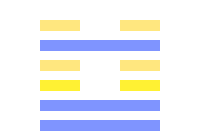
60.1.2.3.5 (60 > 15) - THE KIEH HEXAGRAM.
- 1. The first line, undivided, shows its subject not quitting the courtyard outside his door. There will be no error.
- 2. The second line, undivided, shows its subject not quitting the courtyard inside his gate. There will be evil.
- 3. The third line, divided, shows its subject with no appearance of observing the (proper) regulations, in which case we shall see him lamenting. But there will be no one to blame (but himself).
- 5. The fifth line, undivided, shows its subject sweetly and acceptably enacting his regulations. There will be good fortune. The onward progress with them will afford ground for admiration.
60.1.2.3.5 (60 > 15) - The limit
One supplies one's relatives despite the shortage.
Bing DeepL Google Yandex60.1.2.3.5 (60 > 15) - The limit
One supplies one's relatives despite the shortage.
Bing DeepL Google Yandex60.1.2.3.5 (60 > 15) - Tsieh, la délimitation
Tsieh : règle, loi, mesure.
-
1. Tel ne sort pas de la porte extérieure de son habitation et n’en a point de regret.
(Dès qu’il voit tout ce qui se passe chez lui, il peut tout y bien gouverner.) Quand on sait qu’il y a lieu de ne pas sortir ou bien empêchement. -
2. Mais s’il ne passe pas la porte intérieure de la maison (celle du quartier intérieur, du quartier des femmes), il éprouvera les mauvais effets de cette conduite. (Ne voyant que partiellement ce qui se passe chez lui, il pourra lui arriver des désagréments.)
Il manquera le point de temps extrême pour faire le nécessaire selon les circonstances. - 3. Qui n’observe pas les lois s’en repentira suffisamment par la suite et se lamentera sans que personne ait besoin de le blâmer. (Ou bien : s’en repentira si amèrement que personne n’aura le courage de le blâmer.)
- 5. Appliquer doucement les lois est une condition de prospérité. En procédant ainsi, on se rendra illustre ; [car on remplit alors ses fonctions parfaitement.]
60.1.2.3.5 (60 > 15) - La limite
On ravitaille ses proches malgré la pénurie.
Bing DeepL Google Yandex60.1.2.3.5 (60 > 15) - Korlátozás
- 1. Nem gyötri saját magát tovább miközben várja hogy visszatérjenek a barátai.
- 2. Elrejti a bizonytalanságokat hogy uralja a helyzetet.
- 3. Túl gyenge hogy táplálja a csoportját így felkészül hogy felszámolja a függőségüket.
- 5. Segítség nélkül felfedez egy új utat hogy megoldja a szükségest, így elismerést kap.

60.4.5 (60 > 54) - THE KIEH HEXAGRAM.
- 4. The fourth line, divided, shows its subject quietly and naturally (attentive to all) regulations. There will be progress and success.
- 5. The fifth line, undivided, shows its subject sweetly and acceptably enacting his regulations. There will be good fortune. The onward progress with them will afford ground for admiration.
60.4.5 (60 > 54) - The limit
One does not speak much because one has received the order to be quiet.
Bing DeepL Google Yandex60.4.5 (60 > 54) - The limit
One does not speak much because one has received the order to be quiet.
Bing DeepL Google Yandex60.4.5 (60 > 54) - Tsieh, la délimitation
Tsieh : règle, loi, mesure.
- 4. Les lois observées pacifiquement donnent la prospérité [et perpétuent le règne de la justice.]
- 5. Appliquer doucement les lois est une condition de prospérité. En procédant ainsi, on se rendra illustre ; [car on remplit alors ses fonctions parfaitement.]
60.4.5 (60 > 54) - La limite
On parle peu car on a reçu l'ordre de se taire.
Bing DeepL Google Yandex60.4.5 (60 > 54) - Korlátozás
- 4. Vonakodik hogy kérje másoktól hogy elfogadják a fáradtságot, így befejezi az előkészítést a legalkalmasabbal.
- 5. Segítség nélkül felfedez egy új utat hogy megoldja a szükségest, így elismerést kap.

60.1.4.5 (60 > 40) - THE KIEH HEXAGRAM.
- 1. The first line, undivided, shows its subject not quitting the courtyard outside his door. There will be no error.
- 4. The fourth line, divided, shows its subject quietly and naturally (attentive to all) regulations. There will be progress and success.
- 5. The fifth line, undivided, shows its subject sweetly and acceptably enacting his regulations. There will be good fortune. The onward progress with them will afford ground for admiration.
60.1.4.5 (60 > 40) - The limit
One receives even more benefits than others when one is ready to satisfy all the demands.
Bing DeepL Google Yandex60.1.4.5 (60 > 40) - The limit
One receives even more benefits than others when one is ready to satisfy all the demands.
Bing DeepL Google Yandex60.1.4.5 (60 > 40) - Tsieh, la délimitation
Tsieh : règle, loi, mesure.
-
1. Tel ne sort pas de la porte extérieure de son habitation et n’en a point de regret.
(Dès qu’il voit tout ce qui se passe chez lui, il peut tout y bien gouverner.) Quand on sait qu’il y a lieu de ne pas sortir ou bien empêchement. - 4. Les lois observées pacifiquement donnent la prospérité [et perpétuent le règne de la justice.]
- 5. Appliquer doucement les lois est une condition de prospérité. En procédant ainsi, on se rendra illustre ; [car on remplit alors ses fonctions parfaitement.]
60.1.4.5 (60 > 40) - La limite
On reçoit encore plus de bienfaits que les autres quand on est prêt à satisfaire toutes les demandes.
Bing DeepL Google Yandex60.1.4.5 (60 > 40) - Korlátozás
- 1. Nem gyötri saját magát tovább miközben várja hogy visszatérjenek a barátai.
- 4. Vonakodik hogy kérje másoktól hogy elfogadják a fáradtságot, így befejezi az előkészítést a legalkalmasabbal.
- 5. Segítség nélkül felfedez egy új utat hogy megoldja a szükségest, így elismerést kap.

60.2.4.5 (60 > 51) - THE KIEH HEXAGRAM.
- 2. The second line, undivided, shows its subject not quitting the courtyard inside his gate. There will be evil.
- 4. The fourth line, divided, shows its subject quietly and naturally (attentive to all) regulations. There will be progress and success.
- 5. The fifth line, undivided, shows its subject sweetly and acceptably enacting his regulations. There will be good fortune. The onward progress with them will afford ground for admiration.
60.2.4.5 (60 > 51) - Tsieh, la délimitation
Tsieh : règle, loi, mesure.
-
2. Mais s’il ne passe pas la porte intérieure de la maison (celle du quartier intérieur, du quartier des femmes), il éprouvera les mauvais effets de cette conduite. (Ne voyant que partiellement ce qui se passe chez lui, il pourra lui arriver des désagréments.)
Il manquera le point de temps extrême pour faire le nécessaire selon les circonstances. - 4. Les lois observées pacifiquement donnent la prospérité [et perpétuent le règne de la justice.]
- 5. Appliquer doucement les lois est une condition de prospérité. En procédant ainsi, on se rendra illustre ; [car on remplit alors ses fonctions parfaitement.]
60.2.4.5 (60 > 51) - La limite
On attrape des crampes à force de faire le pied de grue.
Bing DeepL Google Yandex60.2.4.5 (60 > 51) - Korlátozás
- 2. Elrejti a bizonytalanságokat hogy uralja a helyzetet.
- 4. Vonakodik hogy kérje másoktól hogy elfogadják a fáradtságot, így befejezi az előkészítést a legalkalmasabbal.
- 5. Segítség nélkül felfedez egy új utat hogy megoldja a szükségest, így elismerést kap.
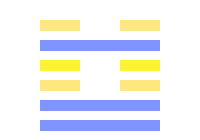
60.1.2.4.5 (60 > 16) - THE KIEH HEXAGRAM.
- 1. The first line, undivided, shows its subject not quitting the courtyard outside his door. There will be no error.
- 2. The second line, undivided, shows its subject not quitting the courtyard inside his gate. There will be evil.
- 4. The fourth line, divided, shows its subject quietly and naturally (attentive to all) regulations. There will be progress and success.
- 5. The fifth line, undivided, shows its subject sweetly and acceptably enacting his regulations. There will be good fortune. The onward progress with them will afford ground for admiration.
60.1.2.4.5 (60 > 16) - The limit
One apologises for the little skill that one has deployed.
Bing DeepL Google Yandex60.1.2.4.5 (60 > 16) - The limit
One apologizes for the little skill that one has deployed.
Bing DeepL Google Yandex60.1.2.4.5 (60 > 16) - Tsieh, la délimitation
Tsieh : règle, loi, mesure.
-
1. Tel ne sort pas de la porte extérieure de son habitation et n’en a point de regret.
(Dès qu’il voit tout ce qui se passe chez lui, il peut tout y bien gouverner.) Quand on sait qu’il y a lieu de ne pas sortir ou bien empêchement. -
2. Mais s’il ne passe pas la porte intérieure de la maison (celle du quartier intérieur, du quartier des femmes), il éprouvera les mauvais effets de cette conduite. (Ne voyant que partiellement ce qui se passe chez lui, il pourra lui arriver des désagréments.)
Il manquera le point de temps extrême pour faire le nécessaire selon les circonstances. - 4. Les lois observées pacifiquement donnent la prospérité [et perpétuent le règne de la justice.]
- 5. Appliquer doucement les lois est une condition de prospérité. En procédant ainsi, on se rendra illustre ; [car on remplit alors ses fonctions parfaitement.]
60.1.2.4.5 (60 > 16) - La limite
On s'excuse du peu de talent que l'on a déployé.
Bing DeepL Google Yandex60.1.2.4.5 (60 > 16) - Korlátozás
- 1. Nem gyötri saját magát tovább miközben várja hogy visszatérjenek a barátai.
- 2. Elrejti a bizonytalanságokat hogy uralja a helyzetet.
- 4. Vonakodik hogy kérje másoktól hogy elfogadják a fáradtságot, így befejezi az előkészítést a legalkalmasabbal.
- 5. Segítség nélkül felfedez egy új utat hogy megoldja a szükségest, így elismerést kap.

60.3.4.5 (60 > 34) - THE KIEH HEXAGRAM.
- 3. The third line, divided, shows its subject with no appearance of observing the (proper) regulations, in which case we shall see him lamenting. But there will be no one to blame (but himself).
- 4. The fourth line, divided, shows its subject quietly and naturally (attentive to all) regulations. There will be progress and success.
- 5. The fifth line, undivided, shows its subject sweetly and acceptably enacting his regulations. There will be good fortune. The onward progress with them will afford ground for admiration.
60.3.4.5 (60 > 34) - The limit
One has arrived safe and sound despite the swell and sea spray.
Bing DeepL Google Yandex60.3.4.5 (60 > 34) - The limit
One has arrived safe and sound despite the swell and sea spray.
Bing DeepL Google Yandex60.3.4.5 (60 > 34) - Tsieh, la délimitation
Tsieh : règle, loi, mesure.
- 3. Qui n’observe pas les lois s’en repentira suffisamment par la suite et se lamentera sans que personne ait besoin de le blâmer. (Ou bien : s’en repentira si amèrement que personne n’aura le courage de le blâmer.)
- 4. Les lois observées pacifiquement donnent la prospérité [et perpétuent le règne de la justice.]
- 5. Appliquer doucement les lois est une condition de prospérité. En procédant ainsi, on se rendra illustre ; [car on remplit alors ses fonctions parfaitement.]
60.3.4.5 (60 > 34) - La limite
On est arrivé à bon port malgré la houle et les embruns.
Bing DeepL Google Yandex60.3.4.5 (60 > 34) - Korlátozás
- 3. Túl gyenge hogy táplálja a csoportját így felkészül hogy felszámolja a függőségüket.
- 4. Vonakodik hogy kérje másoktól hogy elfogadják a fáradtságot, így befejezi az előkészítést a legalkalmasabbal.
- 5. Segítség nélkül felfedez egy új utat hogy megoldja a szükségest, így elismerést kap.

60.1.3.4.5 (60 > 32) - THE KIEH HEXAGRAM.
- 1. The first line, undivided, shows its subject not quitting the courtyard outside his door. There will be no error.
- 3. The third line, divided, shows its subject with no appearance of observing the (proper) regulations, in which case we shall see him lamenting. But there will be no one to blame (but himself).
- 4. The fourth line, divided, shows its subject quietly and naturally (attentive to all) regulations. There will be progress and success.
- 5. The fifth line, undivided, shows its subject sweetly and acceptably enacting his regulations. There will be good fortune. The onward progress with them will afford ground for admiration.
60.1.3.4.5 (60 > 32) - The limit
One starves to death when the others take everything.
Bing DeepL Google Yandex60.1.3.4.5 (60 > 32) - The limit
One starves to death when the others take everything.
Bing DeepL Google Yandex60.1.3.4.5 (60 > 32) - Tsieh, la délimitation
Tsieh : règle, loi, mesure.
-
1. Tel ne sort pas de la porte extérieure de son habitation et n’en a point de regret.
(Dès qu’il voit tout ce qui se passe chez lui, il peut tout y bien gouverner.) Quand on sait qu’il y a lieu de ne pas sortir ou bien empêchement. - 3. Qui n’observe pas les lois s’en repentira suffisamment par la suite et se lamentera sans que personne ait besoin de le blâmer. (Ou bien : s’en repentira si amèrement que personne n’aura le courage de le blâmer.)
- 4. Les lois observées pacifiquement donnent la prospérité [et perpétuent le règne de la justice.]
- 5. Appliquer doucement les lois est une condition de prospérité. En procédant ainsi, on se rendra illustre ; [car on remplit alors ses fonctions parfaitement.]
60.1.3.4.5 (60 > 32) - La limite
On crève de faim quand les autres prennent tout.
Bing DeepL Google Yandex60.1.3.4.5 (60 > 32) - Korlátozás
- 1. Nem gyötri saját magát tovább miközben várja hogy visszatérjenek a barátai.
- 3. Túl gyenge hogy táplálja a csoportját így felkészül hogy felszámolja a függőségüket.
- 4. Vonakodik hogy kérje másoktól hogy elfogadják a fáradtságot, így befejezi az előkészítést a legalkalmasabbal.
- 5. Segítség nélkül felfedez egy új utat hogy megoldja a szükségest, így elismerést kap.

60.2.3.4.5 (60 > 55) - THE KIEH HEXAGRAM.
- 2. The second line, undivided, shows its subject not quitting the courtyard inside his gate. There will be evil.
- 3. The third line, divided, shows its subject with no appearance of observing the (proper) regulations, in which case we shall see him lamenting. But there will be no one to blame (but himself).
- 4. The fourth line, divided, shows its subject quietly and naturally (attentive to all) regulations. There will be progress and success.
- 5. The fifth line, undivided, shows its subject sweetly and acceptably enacting his regulations. There will be good fortune. The onward progress with them will afford ground for admiration.
60.2.3.4.5 (60 > 55) - The limit
One absolves one's companions of all their mistakes in exchange for a little honesty.
Bing DeepL Google Yandex60.2.3.4.5 (60 > 55) - The limit
One absolves one's companions of all their mistakes in exchange for a little honesty.
Bing DeepL Google Yandex60.2.3.4.5 (60 > 55) - Tsieh, la délimitation
Tsieh : règle, loi, mesure.
-
2. Mais s’il ne passe pas la porte intérieure de la maison (celle du quartier intérieur, du quartier des femmes), il éprouvera les mauvais effets de cette conduite. (Ne voyant que partiellement ce qui se passe chez lui, il pourra lui arriver des désagréments.)
Il manquera le point de temps extrême pour faire le nécessaire selon les circonstances. - 3. Qui n’observe pas les lois s’en repentira suffisamment par la suite et se lamentera sans que personne ait besoin de le blâmer. (Ou bien : s’en repentira si amèrement que personne n’aura le courage de le blâmer.)
- 4. Les lois observées pacifiquement donnent la prospérité [et perpétuent le règne de la justice.]
- 5. Appliquer doucement les lois est une condition de prospérité. En procédant ainsi, on se rendra illustre ; [car on remplit alors ses fonctions parfaitement.]
60.2.3.4.5 (60 > 55) - La limite
On absout ses compagnons de toutes leurs erreurs en échange d'un peu d'honnêteté.
Bing DeepL Google Yandex60.2.3.4.5 (60 > 55) - Korlátozás
- 2. Elrejti a bizonytalanságokat hogy uralja a helyzetet.
- 3. Túl gyenge hogy táplálja a csoportját így felkészül hogy felszámolja a függőségüket.
- 4. Vonakodik hogy kérje másoktól hogy elfogadják a fáradtságot, így befejezi az előkészítést a legalkalmasabbal.
- 5. Segítség nélkül felfedez egy új utat hogy megoldja a szükségest, így elismerést kap.
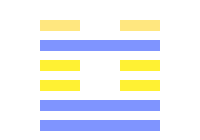
60.1.2.3.4.5 (60 > 62) - THE KIEH HEXAGRAM.
- 1. The first line, undivided, shows its subject not quitting the courtyard outside his door. There will be no error.
- 2. The second line, undivided, shows its subject not quitting the courtyard inside his gate. There will be evil.
- 3. The third line, divided, shows its subject with no appearance of observing the (proper) regulations, in which case we shall see him lamenting. But there will be no one to blame (but himself).
- 4. The fourth line, divided, shows its subject quietly and naturally (attentive to all) regulations. There will be progress and success.
- 5. The fifth line, undivided, shows its subject sweetly and acceptably enacting his regulations. There will be good fortune. The onward progress with them will afford ground for admiration.
60.1.2.3.4.5 (60 > 62) - The limit
One does way more than the others want because one is afraid that they have underestimated the difficulties.
Bing DeepL Google Yandex60.1.2.3.4.5 (60 > 62) - The limit
One does way more than the others want because one is afraid that they have underestimated the difficulties.
Bing DeepL Google Yandex60.1.2.3.4.5 (60 > 62) - Tsieh, la délimitation
Tsieh : règle, loi, mesure.
-
1. Tel ne sort pas de la porte extérieure de son habitation et n’en a point de regret.
(Dès qu’il voit tout ce qui se passe chez lui, il peut tout y bien gouverner.) Quand on sait qu’il y a lieu de ne pas sortir ou bien empêchement. -
2. Mais s’il ne passe pas la porte intérieure de la maison (celle du quartier intérieur, du quartier des femmes), il éprouvera les mauvais effets de cette conduite. (Ne voyant que partiellement ce qui se passe chez lui, il pourra lui arriver des désagréments.)
Il manquera le point de temps extrême pour faire le nécessaire selon les circonstances. - 3. Qui n’observe pas les lois s’en repentira suffisamment par la suite et se lamentera sans que personne ait besoin de le blâmer. (Ou bien : s’en repentira si amèrement que personne n’aura le courage de le blâmer.)
- 4. Les lois observées pacifiquement donnent la prospérité [et perpétuent le règne de la justice.]
- 5. Appliquer doucement les lois est une condition de prospérité. En procédant ainsi, on se rendra illustre ; [car on remplit alors ses fonctions parfaitement.]
60.1.2.3.4.5 (60 > 62) - La limite
On fait bien plus que ce que les autres veulent car on a peur qu'ils aient sous-estimé les difficultés.
Bing DeepL Google Yandex60.1.2.3.4.5 (60 > 62) - Korlátozás
- 1. Nem gyötri saját magát tovább miközben várja hogy visszatérjenek a barátai.
- 2. Elrejti a bizonytalanságokat hogy uralja a helyzetet.
- 3. Túl gyenge hogy táplálja a csoportját így felkészül hogy felszámolja a függőségüket.
- 4. Vonakodik hogy kérje másoktól hogy elfogadják a fáradtságot, így befejezi az előkészítést a legalkalmasabbal.
- 5. Segítség nélkül felfedez egy új utat hogy megoldja a szükségest, így elismerést kap.

60.5.6 (60 > 41) - THE KIEH HEXAGRAM.
- 5. The fifth line, undivided, shows its subject sweetly and acceptably enacting his regulations. There will be good fortune. The onward progress with them will afford ground for admiration.
- 6. The topmost line, divided, shows its subject enacting regulations severe and difficult. Even with firmness and correctness there will be evil. But though there will be cause for repentance, it will (by and by) disappear.
60.5.6 (60 > 41) - The limit
One plows one's furrow to cultivate fertile land.
Bing DeepL Google Yandex60.5.6 (60 > 41) - The limit
One plows one's furrow to cultivate fertile land.
Bing DeepL Google Yandex60.5.6 (60 > 41) - Tsieh, la délimitation
Tsieh : règle, loi, mesure.
- 5. Appliquer doucement les lois est une condition de prospérité. En procédant ainsi, on se rendra illustre ; [car on remplit alors ses fonctions parfaitement.]
- 6. Les lois dures ont des conséquences très fâcheuses pour la prospérité. Le repentir (causé par leur violation) s’effacera. [Leur force et valeur s’épuiseront.] (Quand le peuple sent que les lois sont cruelles, il les viole sans scrupule ni repentir.)
60.5.6 (60 > 41) - La limite
On trace son sillon pour labourer une terre fertile.
Bing DeepL Google Yandex60.5.6 (60 > 41) - Korlátozás
- 5. Segítség nélkül felfedez egy új utat hogy megoldja a szükségest, így elismerést kap.
- 6. Nagy nyomás alatt.

60.1.5.6 (60 > 4) - THE KIEH HEXAGRAM.
- 1. The first line, undivided, shows its subject not quitting the courtyard outside his door. There will be no error.
- 5. The fifth line, undivided, shows its subject sweetly and acceptably enacting his regulations. There will be good fortune. The onward progress with them will afford ground for admiration.
- 6. The topmost line, divided, shows its subject enacting regulations severe and difficult. Even with firmness and correctness there will be evil. But though there will be cause for repentance, it will (by and by) disappear.
60.1.5.6 (60 > 4) - The limit
One is going to have to defend oneself from those who want to know how one learned.
Bing DeepL Google Yandex60.1.5.6 (60 > 4) - The limit
One is going to have to defend oneself from those who want to know how one learned.
Bing DeepL Google Yandex60.1.5.6 (60 > 4) - Tsieh, la délimitation
Tsieh : règle, loi, mesure.
-
1. Tel ne sort pas de la porte extérieure de son habitation et n’en a point de regret.
(Dès qu’il voit tout ce qui se passe chez lui, il peut tout y bien gouverner.) Quand on sait qu’il y a lieu de ne pas sortir ou bien empêchement. - 5. Appliquer doucement les lois est une condition de prospérité. En procédant ainsi, on se rendra illustre ; [car on remplit alors ses fonctions parfaitement.]
- 6. Les lois dures ont des conséquences très fâcheuses pour la prospérité. Le repentir (causé par leur violation) s’effacera. [Leur force et valeur s’épuiseront.] (Quand le peuple sent que les lois sont cruelles, il les viole sans scrupule ni repentir.)
60.1.5.6 (60 > 4) - La limite
On va devoir se défendre de ceux qui veulent savoir comment on a appris.
Bing DeepL Google Yandex60.1.5.6 (60 > 4) - Korlátozás
- 1. Nem gyötri saját magát tovább miközben várja hogy visszatérjenek a barátai.
- 5. Segítség nélkül felfedez egy új utat hogy megoldja a szükségest, így elismerést kap.
- 6. Nagy nyomás alatt.

60.2.5.6 (60 > 27) - THE KIEH HEXAGRAM.
- 2. The second line, undivided, shows its subject not quitting the courtyard inside his gate. There will be evil.
- 5. The fifth line, undivided, shows its subject sweetly and acceptably enacting his regulations. There will be good fortune. The onward progress with them will afford ground for admiration.
- 6. The topmost line, divided, shows its subject enacting regulations severe and difficult. Even with firmness and correctness there will be evil. But though there will be cause for repentance, it will (by and by) disappear.
60.2.5.6 (60 > 27) - The limit
One refuses to give one's guests the slightest token of sympathy.
Bing DeepL Google Yandex60.2.5.6 (60 > 27) - The limit
One refuses to give one's guests the slightest token of sympathy.
Bing DeepL Google Yandex60.2.5.6 (60 > 27) - Tsieh, la délimitation
Tsieh : règle, loi, mesure.
-
2. Mais s’il ne passe pas la porte intérieure de la maison (celle du quartier intérieur, du quartier des femmes), il éprouvera les mauvais effets de cette conduite. (Ne voyant que partiellement ce qui se passe chez lui, il pourra lui arriver des désagréments.)
Il manquera le point de temps extrême pour faire le nécessaire selon les circonstances. - 5. Appliquer doucement les lois est une condition de prospérité. En procédant ainsi, on se rendra illustre ; [car on remplit alors ses fonctions parfaitement.]
- 6. Les lois dures ont des conséquences très fâcheuses pour la prospérité. Le repentir (causé par leur violation) s’effacera. [Leur force et valeur s’épuiseront.] (Quand le peuple sent que les lois sont cruelles, il les viole sans scrupule ni repentir.)
60.2.5.6 (60 > 27) - La limite
On refuse de donner à ses hôtes le moindre gage de sympathie.
Bing DeepL Google Yandex60.2.5.6 (60 > 27) - Korlátozás
- 2. Elrejti a bizonytalanságokat hogy uralja a helyzetet.
- 5. Segítség nélkül felfedez egy új utat hogy megoldja a szükségest, így elismerést kap.
- 6. Nagy nyomás alatt.
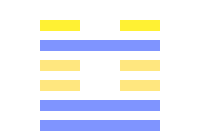
60.1.2.5.6 (60 > 23) - THE KIEH HEXAGRAM.
- 1. The first line, undivided, shows its subject not quitting the courtyard outside his door. There will be no error.
- 2. The second line, undivided, shows its subject not quitting the courtyard inside his gate. There will be evil.
- 5. The fifth line, undivided, shows its subject sweetly and acceptably enacting his regulations. There will be good fortune. The onward progress with them will afford ground for admiration.
- 6. The topmost line, divided, shows its subject enacting regulations severe and difficult. Even with firmness and correctness there will be evil. But though there will be cause for repentance, it will (by and by) disappear.
60.1.2.5.6 (60 > 23) - The limit
One beats around the bush with one's opponents to make them wait.
Bing DeepL Google Yandex60.1.2.5.6 (60 > 23) - The limit
One beats around the bush with one's opponents to make them wait.
Bing DeepL Google Yandex60.1.2.5.6 (60 > 23) - Tsieh, la délimitation
Tsieh : règle, loi, mesure.
-
1. Tel ne sort pas de la porte extérieure de son habitation et n’en a point de regret.
(Dès qu’il voit tout ce qui se passe chez lui, il peut tout y bien gouverner.) Quand on sait qu’il y a lieu de ne pas sortir ou bien empêchement. -
2. Mais s’il ne passe pas la porte intérieure de la maison (celle du quartier intérieur, du quartier des femmes), il éprouvera les mauvais effets de cette conduite. (Ne voyant que partiellement ce qui se passe chez lui, il pourra lui arriver des désagréments.)
Il manquera le point de temps extrême pour faire le nécessaire selon les circonstances. - 5. Appliquer doucement les lois est une condition de prospérité. En procédant ainsi, on se rendra illustre ; [car on remplit alors ses fonctions parfaitement.]
- 6. Les lois dures ont des conséquences très fâcheuses pour la prospérité. Le repentir (causé par leur violation) s’effacera. [Leur force et valeur s’épuiseront.] (Quand le peuple sent que les lois sont cruelles, il les viole sans scrupule ni repentir.)
60.1.2.5.6 (60 > 23) - La limite
On finasse avec ses adversaires pour les faire patienter.
Bing DeepL Google Yandex60.1.2.5.6 (60 > 23) - Korlátozás
- 1. Nem gyötri saját magát tovább miközben várja hogy visszatérjenek a barátai.
- 2. Elrejti a bizonytalanságokat hogy uralja a helyzetet.
- 5. Segítség nélkül felfedez egy új utat hogy megoldja a szükségest, így elismerést kap.
- 6. Nagy nyomás alatt.

60.3.5.6 (60 > 26) - THE KIEH HEXAGRAM.
- 3. The third line, divided, shows its subject with no appearance of observing the (proper) regulations, in which case we shall see him lamenting. But there will be no one to blame (but himself).
- 5. The fifth line, undivided, shows its subject sweetly and acceptably enacting his regulations. There will be good fortune. The onward progress with them will afford ground for admiration.
- 6. The topmost line, divided, shows its subject enacting regulations severe and difficult. Even with firmness and correctness there will be evil. But though there will be cause for repentance, it will (by and by) disappear.
60.3.5.6 (60 > 26) - The limit
One knows what use can be made of what one is holding in one's hands.
Bing DeepL Google Yandex60.3.5.6 (60 > 26) - The limit
One knows what use can be made of what one is holding in one's hands.
Bing DeepL Google Yandex60.3.5.6 (60 > 26) - Tsieh, la délimitation
Tsieh : règle, loi, mesure.
- 3. Qui n’observe pas les lois s’en repentira suffisamment par la suite et se lamentera sans que personne ait besoin de le blâmer. (Ou bien : s’en repentira si amèrement que personne n’aura le courage de le blâmer.)
- 5. Appliquer doucement les lois est une condition de prospérité. En procédant ainsi, on se rendra illustre ; [car on remplit alors ses fonctions parfaitement.]
- 6. Les lois dures ont des conséquences très fâcheuses pour la prospérité. Le repentir (causé par leur violation) s’effacera. [Leur force et valeur s’épuiseront.] (Quand le peuple sent que les lois sont cruelles, il les viole sans scrupule ni repentir.)
60.3.5.6 (60 > 26) - La limite
On sait quelle utilisation on pourra faire de ce qu'on tient entre ses mains.
Bing DeepL Google Yandex60.3.5.6 (60 > 26) - Korlátozás
- 3. Túl gyenge hogy táplálja a csoportját így felkészül hogy felszámolja a függőségüket.
- 5. Segítség nélkül felfedez egy új utat hogy megoldja a szükségest, így elismerést kap.
- 6. Nagy nyomás alatt.

60.1.3.5.6 (60 > 18) - THE KIEH HEXAGRAM.
- 1. The first line, undivided, shows its subject not quitting the courtyard outside his door. There will be no error.
- 3. The third line, divided, shows its subject with no appearance of observing the (proper) regulations, in which case we shall see him lamenting. But there will be no one to blame (but himself).
- 5. The fifth line, undivided, shows its subject sweetly and acceptably enacting his regulations. There will be good fortune. The onward progress with them will afford ground for admiration.
- 6. The topmost line, divided, shows its subject enacting regulations severe and difficult. Even with firmness and correctness there will be evil. But though there will be cause for repentance, it will (by and by) disappear.
60.1.3.5.6 (60 > 18) - The limit
One resolves a dilemma by going to the side that seems most promising.
Bing DeepL Google Yandex60.1.3.5.6 (60 > 18) - The limit
One resolves a dilemma by going to the side that seems most promising.
Bing DeepL Google Yandex60.1.3.5.6 (60 > 18) - Tsieh, la délimitation
Tsieh : règle, loi, mesure.
-
1. Tel ne sort pas de la porte extérieure de son habitation et n’en a point de regret.
(Dès qu’il voit tout ce qui se passe chez lui, il peut tout y bien gouverner.) Quand on sait qu’il y a lieu de ne pas sortir ou bien empêchement. - 3. Qui n’observe pas les lois s’en repentira suffisamment par la suite et se lamentera sans que personne ait besoin de le blâmer. (Ou bien : s’en repentira si amèrement que personne n’aura le courage de le blâmer.)
- 5. Appliquer doucement les lois est une condition de prospérité. En procédant ainsi, on se rendra illustre ; [car on remplit alors ses fonctions parfaitement.]
- 6. Les lois dures ont des conséquences très fâcheuses pour la prospérité. Le repentir (causé par leur violation) s’effacera. [Leur force et valeur s’épuiseront.] (Quand le peuple sent que les lois sont cruelles, il les viole sans scrupule ni repentir.)
60.1.3.5.6 (60 > 18) - La limite
On tranche un dilemme en allant du côté qui semble le plus prometteur.
Bing DeepL Google Yandex60.1.3.5.6 (60 > 18) - Korlátozás
- 1. Nem gyötri saját magát tovább miközben várja hogy visszatérjenek a barátai.
- 3. Túl gyenge hogy táplálja a csoportját így felkészül hogy felszámolja a függőségüket.
- 5. Segítség nélkül felfedez egy új utat hogy megoldja a szükségest, így elismerést kap.
- 6. Nagy nyomás alatt.

60.2.3.5.6 (60 > 22) - THE KIEH HEXAGRAM.
- 2. The second line, undivided, shows its subject not quitting the courtyard inside his gate. There will be evil.
- 3. The third line, divided, shows its subject with no appearance of observing the (proper) regulations, in which case we shall see him lamenting. But there will be no one to blame (but himself).
- 5. The fifth line, undivided, shows its subject sweetly and acceptably enacting his regulations. There will be good fortune. The onward progress with them will afford ground for admiration.
- 6. The topmost line, divided, shows its subject enacting regulations severe and difficult. Even with firmness and correctness there will be evil. But though there will be cause for repentance, it will (by and by) disappear.
60.2.3.5.6 (60 > 22) - The limit
One uses one's social skills to get news from unreachable people.
Bing DeepL Google Yandex60.2.3.5.6 (60 > 22) - The limit
One uses one's social skills to get news from unreachable people.
Bing DeepL Google Yandex60.2.3.5.6 (60 > 22) - Tsieh, la délimitation
Tsieh : règle, loi, mesure.
-
2. Mais s’il ne passe pas la porte intérieure de la maison (celle du quartier intérieur, du quartier des femmes), il éprouvera les mauvais effets de cette conduite. (Ne voyant que partiellement ce qui se passe chez lui, il pourra lui arriver des désagréments.)
Il manquera le point de temps extrême pour faire le nécessaire selon les circonstances. - 3. Qui n’observe pas les lois s’en repentira suffisamment par la suite et se lamentera sans que personne ait besoin de le blâmer. (Ou bien : s’en repentira si amèrement que personne n’aura le courage de le blâmer.)
- 5. Appliquer doucement les lois est une condition de prospérité. En procédant ainsi, on se rendra illustre ; [car on remplit alors ses fonctions parfaitement.]
- 6. Les lois dures ont des conséquences très fâcheuses pour la prospérité. Le repentir (causé par leur violation) s’effacera. [Leur force et valeur s’épuiseront.] (Quand le peuple sent que les lois sont cruelles, il les viole sans scrupule ni repentir.)
60.2.3.5.6 (60 > 22) - La limite
On utilise son entregent pour obtenir des nouvelles de personnes inaccessibles.
Bing DeepL Google Yandex60.2.3.5.6 (60 > 22) - Korlátozás
- 2. Elrejti a bizonytalanságokat hogy uralja a helyzetet.
- 3. Túl gyenge hogy táplálja a csoportját így felkészül hogy felszámolja a függőségüket.
- 5. Segítség nélkül felfedez egy új utat hogy megoldja a szükségest, így elismerést kap.
- 6. Nagy nyomás alatt.
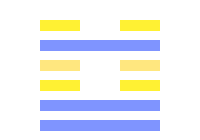
60.1.2.3.5.6 (60 > 52) - THE KIEH HEXAGRAM.
- 1. The first line, undivided, shows its subject not quitting the courtyard outside his door. There will be no error.
- 2. The second line, undivided, shows its subject not quitting the courtyard inside his gate. There will be evil.
- 3. The third line, divided, shows its subject with no appearance of observing the (proper) regulations, in which case we shall see him lamenting. But there will be no one to blame (but himself).
- 5. The fifth line, undivided, shows its subject sweetly and acceptably enacting his regulations. There will be good fortune. The onward progress with them will afford ground for admiration.
- 6. The topmost line, divided, shows its subject enacting regulations severe and difficult. Even with firmness and correctness there will be evil. But though there will be cause for repentance, it will (by and by) disappear.
60.1.2.3.5.6 (60 > 52) - The limit
One executes the orders as they were given.
Bing DeepL Google Yandex60.1.2.3.5.6 (60 > 52) - The limit
One executes the orders as they were given.
Bing DeepL Google Yandex60.1.2.3.5.6 (60 > 52) - Tsieh, la délimitation
Tsieh : règle, loi, mesure.
-
1. Tel ne sort pas de la porte extérieure de son habitation et n’en a point de regret.
(Dès qu’il voit tout ce qui se passe chez lui, il peut tout y bien gouverner.) Quand on sait qu’il y a lieu de ne pas sortir ou bien empêchement. -
2. Mais s’il ne passe pas la porte intérieure de la maison (celle du quartier intérieur, du quartier des femmes), il éprouvera les mauvais effets de cette conduite. (Ne voyant que partiellement ce qui se passe chez lui, il pourra lui arriver des désagréments.)
Il manquera le point de temps extrême pour faire le nécessaire selon les circonstances. - 3. Qui n’observe pas les lois s’en repentira suffisamment par la suite et se lamentera sans que personne ait besoin de le blâmer. (Ou bien : s’en repentira si amèrement que personne n’aura le courage de le blâmer.)
- 5. Appliquer doucement les lois est une condition de prospérité. En procédant ainsi, on se rendra illustre ; [car on remplit alors ses fonctions parfaitement.]
- 6. Les lois dures ont des conséquences très fâcheuses pour la prospérité. Le repentir (causé par leur violation) s’effacera. [Leur force et valeur s’épuiseront.] (Quand le peuple sent que les lois sont cruelles, il les viole sans scrupule ni repentir.)
60.1.2.3.5.6 (60 > 52) - La limite
On exécute les ordres tels qu'ils ont été communiqués.
Bing DeepL Google Yandex60.1.2.3.5.6 (60 > 52) - Korlátozás
- 1. Nem gyötri saját magát tovább miközben várja hogy visszatérjenek a barátai.
- 2. Elrejti a bizonytalanságokat hogy uralja a helyzetet.
- 3. Túl gyenge hogy táplálja a csoportját így felkészül hogy felszámolja a függőségüket.
- 5. Segítség nélkül felfedez egy új utat hogy megoldja a szükségest, így elismerést kap.
- 6. Nagy nyomás alatt.

60.4.5.6 (60 > 38) - THE KIEH HEXAGRAM.
- 4. The fourth line, divided, shows its subject quietly and naturally (attentive to all) regulations. There will be progress and success.
- 5. The fifth line, undivided, shows its subject sweetly and acceptably enacting his regulations. There will be good fortune. The onward progress with them will afford ground for admiration.
- 6. The topmost line, divided, shows its subject enacting regulations severe and difficult. Even with firmness and correctness there will be evil. But though there will be cause for repentance, it will (by and by) disappear.
60.4.5.6 (60 > 38) - The limit
One makes a discount to those who have pleased the management.
Bing DeepL Google Yandex60.4.5.6 (60 > 38) - The limit
One makes a discount to those who have pleased the management.
Bing DeepL Google Yandex60.4.5.6 (60 > 38) - Tsieh, la délimitation
Tsieh : règle, loi, mesure.
- 4. Les lois observées pacifiquement donnent la prospérité [et perpétuent le règne de la justice.]
- 5. Appliquer doucement les lois est une condition de prospérité. En procédant ainsi, on se rendra illustre ; [car on remplit alors ses fonctions parfaitement.]
- 6. Les lois dures ont des conséquences très fâcheuses pour la prospérité. Le repentir (causé par leur violation) s’effacera. [Leur force et valeur s’épuiseront.] (Quand le peuple sent que les lois sont cruelles, il les viole sans scrupule ni repentir.)
60.4.5.6 (60 > 38) - La limite
On fait une ristourne à ceux qui ont plu à la direction.
Bing DeepL Google Yandex60.4.5.6 (60 > 38) - Korlátozás
- 4. Vonakodik hogy kérje másoktól hogy elfogadják a fáradtságot, így befejezi az előkészítést a legalkalmasabbal.
- 5. Segítség nélkül felfedez egy új utat hogy megoldja a szükségest, így elismerést kap.
- 6. Nagy nyomás alatt.

60.1.4.5.6 (60 > 64) - THE KIEH HEXAGRAM.
- 1. The first line, undivided, shows its subject not quitting the courtyard outside his door. There will be no error.
- 4. The fourth line, divided, shows its subject quietly and naturally (attentive to all) regulations. There will be progress and success.
- 5. The fifth line, undivided, shows its subject sweetly and acceptably enacting his regulations. There will be good fortune. The onward progress with them will afford ground for admiration.
- 6. The topmost line, divided, shows its subject enacting regulations severe and difficult. Even with firmness and correctness there will be evil. But though there will be cause for repentance, it will (by and by) disappear.
60.1.4.5.6 (60 > 64) - The limit
One whines all the time whereas others do their best.
Bing DeepL Google Yandex60.1.4.5.6 (60 > 64) - The limit
One whines all the time whereas others do their best.
Bing DeepL Google Yandex60.1.4.5.6 (60 > 64) - Tsieh, la délimitation
Tsieh : règle, loi, mesure.
-
1. Tel ne sort pas de la porte extérieure de son habitation et n’en a point de regret.
(Dès qu’il voit tout ce qui se passe chez lui, il peut tout y bien gouverner.) Quand on sait qu’il y a lieu de ne pas sortir ou bien empêchement. - 4. Les lois observées pacifiquement donnent la prospérité [et perpétuent le règne de la justice.]
- 5. Appliquer doucement les lois est une condition de prospérité. En procédant ainsi, on se rendra illustre ; [car on remplit alors ses fonctions parfaitement.]
- 6. Les lois dures ont des conséquences très fâcheuses pour la prospérité. Le repentir (causé par leur violation) s’effacera. [Leur force et valeur s’épuiseront.] (Quand le peuple sent que les lois sont cruelles, il les viole sans scrupule ni repentir.)
60.1.4.5.6 (60 > 64) - La limite
On se plaint sans cesse alors que les autres font de leur mieux.
Bing DeepL Google Yandex60.1.4.5.6 (60 > 64) - Korlátozás
- 1. Nem gyötri saját magát tovább miközben várja hogy visszatérjenek a barátai.
- 4. Vonakodik hogy kérje másoktól hogy elfogadják a fáradtságot, így befejezi az előkészítést a legalkalmasabbal.
- 5. Segítség nélkül felfedez egy új utat hogy megoldja a szükségest, így elismerést kap.
- 6. Nagy nyomás alatt.

60.2.4.5.6 (60 > 21) - THE KIEH HEXAGRAM.
- 2. The second line, undivided, shows its subject not quitting the courtyard inside his gate. There will be evil.
- 4. The fourth line, divided, shows its subject quietly and naturally (attentive to all) regulations. There will be progress and success.
- 5. The fifth line, undivided, shows its subject sweetly and acceptably enacting his regulations. There will be good fortune. The onward progress with them will afford ground for admiration.
- 6. The topmost line, divided, shows its subject enacting regulations severe and difficult. Even with firmness and correctness there will be evil. But though there will be cause for repentance, it will (by and by) disappear.
60.2.4.5.6 (60 > 21) - The limit
One is dying to be able to say what one thinks.
Bing DeepL Google Yandex60.2.4.5.6 (60 > 21) - The limit
One is dying to be able to say what one thinks.
Bing DeepL Google Yandex60.2.4.5.6 (60 > 21) - Tsieh, la délimitation
Tsieh : règle, loi, mesure.
-
2. Mais s’il ne passe pas la porte intérieure de la maison (celle du quartier intérieur, du quartier des femmes), il éprouvera les mauvais effets de cette conduite. (Ne voyant que partiellement ce qui se passe chez lui, il pourra lui arriver des désagréments.)
Il manquera le point de temps extrême pour faire le nécessaire selon les circonstances. - 4. Les lois observées pacifiquement donnent la prospérité [et perpétuent le règne de la justice.]
- 5. Appliquer doucement les lois est une condition de prospérité. En procédant ainsi, on se rendra illustre ; [car on remplit alors ses fonctions parfaitement.]
- 6. Les lois dures ont des conséquences très fâcheuses pour la prospérité. Le repentir (causé par leur violation) s’effacera. [Leur force et valeur s’épuiseront.] (Quand le peuple sent que les lois sont cruelles, il les viole sans scrupule ni repentir.)
60.2.4.5.6 (60 > 21) - La limite
On meurt d'envie de pouvoir dire ce qu'on pense.
Bing DeepL Google Yandex60.2.4.5.6 (60 > 21) - Korlátozás
- 2. Elrejti a bizonytalanságokat hogy uralja a helyzetet.
- 4. Vonakodik hogy kérje másoktól hogy elfogadják a fáradtságot, így befejezi az előkészítést a legalkalmasabbal.
- 5. Segítség nélkül felfedez egy új utat hogy megoldja a szükségest, így elismerést kap.
- 6. Nagy nyomás alatt.
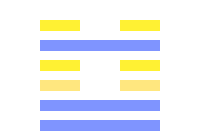
60.1.2.4.5.6 (60 > 35) - THE KIEH HEXAGRAM.
- 1. The first line, undivided, shows its subject not quitting the courtyard outside his door. There will be no error.
- 2. The second line, undivided, shows its subject not quitting the courtyard inside his gate. There will be evil.
- 4. The fourth line, divided, shows its subject quietly and naturally (attentive to all) regulations. There will be progress and success.
- 5. The fifth line, undivided, shows its subject sweetly and acceptably enacting his regulations. There will be good fortune. The onward progress with them will afford ground for admiration.
- 6. The topmost line, divided, shows its subject enacting regulations severe and difficult. Even with firmness and correctness there will be evil. But though there will be cause for repentance, it will (by and by) disappear.
60.1.2.4.5.6 (60 > 35) - The limit
One listens again tirelessly to resounding speeches.
Bing DeepL Google Yandex60.1.2.4.5.6 (60 > 35) - The limit
One listens again tirelessly to resounding speeches.
Bing DeepL Google Yandex60.1.2.4.5.6 (60 > 35) - Tsieh, la délimitation
Tsieh : règle, loi, mesure.
-
1. Tel ne sort pas de la porte extérieure de son habitation et n’en a point de regret.
(Dès qu’il voit tout ce qui se passe chez lui, il peut tout y bien gouverner.) Quand on sait qu’il y a lieu de ne pas sortir ou bien empêchement. -
2. Mais s’il ne passe pas la porte intérieure de la maison (celle du quartier intérieur, du quartier des femmes), il éprouvera les mauvais effets de cette conduite. (Ne voyant que partiellement ce qui se passe chez lui, il pourra lui arriver des désagréments.)
Il manquera le point de temps extrême pour faire le nécessaire selon les circonstances. - 4. Les lois observées pacifiquement donnent la prospérité [et perpétuent le règne de la justice.]
- 5. Appliquer doucement les lois est une condition de prospérité. En procédant ainsi, on se rendra illustre ; [car on remplit alors ses fonctions parfaitement.]
- 6. Les lois dures ont des conséquences très fâcheuses pour la prospérité. Le repentir (causé par leur violation) s’effacera. [Leur force et valeur s’épuiseront.] (Quand le peuple sent que les lois sont cruelles, il les viole sans scrupule ni repentir.)
60.1.2.4.5.6 (60 > 35) - La limite
On réécoute sans se lasser des discours retentissants.
Bing DeepL Google Yandex60.1.2.4.5.6 (60 > 35) - Korlátozás
- 1. Nem gyötri saját magát tovább miközben várja hogy visszatérjenek a barátai.
- 2. Elrejti a bizonytalanságokat hogy uralja a helyzetet.
- 4. Vonakodik hogy kérje másoktól hogy elfogadják a fáradtságot, így befejezi az előkészítést a legalkalmasabbal.
- 5. Segítség nélkül felfedez egy új utat hogy megoldja a szükségest, így elismerést kap.
- 6. Nagy nyomás alatt.

60.3.4.5.6 (60 > 14) - THE KIEH HEXAGRAM.
- 3. The third line, divided, shows its subject with no appearance of observing the (proper) regulations, in which case we shall see him lamenting. But there will be no one to blame (but himself).
- 4. The fourth line, divided, shows its subject quietly and naturally (attentive to all) regulations. There will be progress and success.
- 5. The fifth line, undivided, shows its subject sweetly and acceptably enacting his regulations. There will be good fortune. The onward progress with them will afford ground for admiration.
- 6. The topmost line, divided, shows its subject enacting regulations severe and difficult. Even with firmness and correctness there will be evil. But though there will be cause for repentance, it will (by and by) disappear.
60.3.4.5.6 (60 > 14) - The limit
One understands too late that the demand is already being met.
Bing DeepL Google Yandex60.3.4.5.6 (60 > 14) - The limit
One understands too late that the demand is already being met.
Bing DeepL Google Yandex60.3.4.5.6 (60 > 14) - Tsieh, la délimitation
Tsieh : règle, loi, mesure.
- 3. Qui n’observe pas les lois s’en repentira suffisamment par la suite et se lamentera sans que personne ait besoin de le blâmer. (Ou bien : s’en repentira si amèrement que personne n’aura le courage de le blâmer.)
- 4. Les lois observées pacifiquement donnent la prospérité [et perpétuent le règne de la justice.]
- 5. Appliquer doucement les lois est une condition de prospérité. En procédant ainsi, on se rendra illustre ; [car on remplit alors ses fonctions parfaitement.]
- 6. Les lois dures ont des conséquences très fâcheuses pour la prospérité. Le repentir (causé par leur violation) s’effacera. [Leur force et valeur s’épuiseront.] (Quand le peuple sent que les lois sont cruelles, il les viole sans scrupule ni repentir.)
60.3.4.5.6 (60 > 14) - La limite
On comprend trop tard que la demande est déjà satisfaite.
Bing DeepL Google Yandex60.3.4.5.6 (60 > 14) - Korlátozás
- 3. Túl gyenge hogy táplálja a csoportját így felkészül hogy felszámolja a függőségüket.
- 4. Vonakodik hogy kérje másoktól hogy elfogadják a fáradtságot, így befejezi az előkészítést a legalkalmasabbal.
- 5. Segítség nélkül felfedez egy új utat hogy megoldja a szükségest, így elismerést kap.
- 6. Nagy nyomás alatt.

60.1.3.4.5.6 (60 > 50) - THE KIEH HEXAGRAM.
- 1. The first line, undivided, shows its subject not quitting the courtyard outside his door. There will be no error.
- 3. The third line, divided, shows its subject with no appearance of observing the (proper) regulations, in which case we shall see him lamenting. But there will be no one to blame (but himself).
- 4. The fourth line, divided, shows its subject quietly and naturally (attentive to all) regulations. There will be progress and success.
- 5. The fifth line, undivided, shows its subject sweetly and acceptably enacting his regulations. There will be good fortune. The onward progress with them will afford ground for admiration.
- 6. The topmost line, divided, shows its subject enacting regulations severe and difficult. Even with firmness and correctness there will be evil. But though there will be cause for repentance, it will (by and by) disappear.
60.1.3.4.5.6 (60 > 50) - The limit
One has slowed down the development of one's company so as not having too many expenses to manage.
Bing DeepL Google Yandex60.1.3.4.5.6 (60 > 50) - The limit
One has slowed down the development of one's company so as not having too many expenses to manage.
Bing DeepL Google Yandex60.1.3.4.5.6 (60 > 50) - Tsieh, la délimitation
Tsieh : règle, loi, mesure.
-
1. Tel ne sort pas de la porte extérieure de son habitation et n’en a point de regret.
(Dès qu’il voit tout ce qui se passe chez lui, il peut tout y bien gouverner.) Quand on sait qu’il y a lieu de ne pas sortir ou bien empêchement. - 3. Qui n’observe pas les lois s’en repentira suffisamment par la suite et se lamentera sans que personne ait besoin de le blâmer. (Ou bien : s’en repentira si amèrement que personne n’aura le courage de le blâmer.)
- 4. Les lois observées pacifiquement donnent la prospérité [et perpétuent le règne de la justice.]
- 5. Appliquer doucement les lois est une condition de prospérité. En procédant ainsi, on se rendra illustre ; [car on remplit alors ses fonctions parfaitement.]
- 6. Les lois dures ont des conséquences très fâcheuses pour la prospérité. Le repentir (causé par leur violation) s’effacera. [Leur force et valeur s’épuiseront.] (Quand le peuple sent que les lois sont cruelles, il les viole sans scrupule ni repentir.)
60.1.3.4.5.6 (60 > 50) - La limite
On a freiné le développement de son entreprise pour ne pas avoir trop de charges à gérer.
Bing DeepL Google Yandex60.1.3.4.5.6 (60 > 50) - Korlátozás
- 1. Nem gyötri saját magát tovább miközben várja hogy visszatérjenek a barátai.
- 3. Túl gyenge hogy táplálja a csoportját így felkészül hogy felszámolja a függőségüket.
- 4. Vonakodik hogy kérje másoktól hogy elfogadják a fáradtságot, így befejezi az előkészítést a legalkalmasabbal.
- 5. Segítség nélkül felfedez egy új utat hogy megoldja a szükségest, így elismerést kap.
- 6. Nagy nyomás alatt.

60.2.3.4.5.6 (60 > 30) - THE KIEH HEXAGRAM.
- 2. The second line, undivided, shows its subject not quitting the courtyard inside his gate. There will be evil.
- 3. The third line, divided, shows its subject with no appearance of observing the (proper) regulations, in which case we shall see him lamenting. But there will be no one to blame (but himself).
- 4. The fourth line, divided, shows its subject quietly and naturally (attentive to all) regulations. There will be progress and success.
- 5. The fifth line, undivided, shows its subject sweetly and acceptably enacting his regulations. There will be good fortune. The onward progress with them will afford ground for admiration.
- 6. The topmost line, divided, shows its subject enacting regulations severe and difficult. Even with firmness and correctness there will be evil. But though there will be cause for repentance, it will (by and by) disappear.
60.2.3.4.5.6 (60 > 30) - The limit
One applies a precept that others have not understood.
Bing DeepL Google Yandex60.2.3.4.5.6 (60 > 30) - The limit
One applies a precept that others have not understood.
Bing DeepL Google Yandex60.2.3.4.5.6 (60 > 30) - Tsieh, la délimitation
Tsieh : règle, loi, mesure.
-
2. Mais s’il ne passe pas la porte intérieure de la maison (celle du quartier intérieur, du quartier des femmes), il éprouvera les mauvais effets de cette conduite. (Ne voyant que partiellement ce qui se passe chez lui, il pourra lui arriver des désagréments.)
Il manquera le point de temps extrême pour faire le nécessaire selon les circonstances. - 3. Qui n’observe pas les lois s’en repentira suffisamment par la suite et se lamentera sans que personne ait besoin de le blâmer. (Ou bien : s’en repentira si amèrement que personne n’aura le courage de le blâmer.)
- 4. Les lois observées pacifiquement donnent la prospérité [et perpétuent le règne de la justice.]
- 5. Appliquer doucement les lois est une condition de prospérité. En procédant ainsi, on se rendra illustre ; [car on remplit alors ses fonctions parfaitement.]
- 6. Les lois dures ont des conséquences très fâcheuses pour la prospérité. Le repentir (causé par leur violation) s’effacera. [Leur force et valeur s’épuiseront.] (Quand le peuple sent que les lois sont cruelles, il les viole sans scrupule ni repentir.)
60.2.3.4.5.6 (60 > 30) - La limite
On applique un précepte que les autres n'ont pas compris.
Bing DeepL Google Yandex60.2.3.4.5.6 (60 > 30) - Korlátozás
- 2. Elrejti a bizonytalanságokat hogy uralja a helyzetet.
- 3. Túl gyenge hogy táplálja a csoportját így felkészül hogy felszámolja a függőségüket.
- 4. Vonakodik hogy kérje másoktól hogy elfogadják a fáradtságot, így befejezi az előkészítést a legalkalmasabbal.
- 5. Segítség nélkül felfedez egy új utat hogy megoldja a szükségest, így elismerést kap.
- 6. Nagy nyomás alatt.
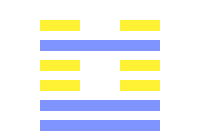
60.1.2.3.4.5.6 (60 > 56) - THE KIEH HEXAGRAM.
- 1. The first line, undivided, shows its subject not quitting the courtyard outside his door. There will be no error.
- 2. The second line, undivided, shows its subject not quitting the courtyard inside his gate. There will be evil.
- 3. The third line, divided, shows its subject with no appearance of observing the (proper) regulations, in which case we shall see him lamenting. But there will be no one to blame (but himself).
- 4. The fourth line, divided, shows its subject quietly and naturally (attentive to all) regulations. There will be progress and success.
- 5. The fifth line, undivided, shows its subject sweetly and acceptably enacting his regulations. There will be good fortune. The onward progress with them will afford ground for admiration.
- 6. The topmost line, divided, shows its subject enacting regulations severe and difficult. Even with firmness and correctness there will be evil. But though there will be cause for repentance, it will (by and by) disappear.
60.1.2.3.4.5.6 (60 > 56) - The limit
One expects from one' s superiors that they will not make any more blunders.
Bing DeepL Google Yandex60.1.2.3.4.5.6 (60 > 56) - The limit
One expects from one' s superiors that they will not make any more blunders.
Bing DeepL Google Yandex60.1.2.3.4.5.6 (60 > 56) - Tsieh, la délimitation
Tsieh : règle, loi, mesure.
-
1. Tel ne sort pas de la porte extérieure de son habitation et n’en a point de regret.
(Dès qu’il voit tout ce qui se passe chez lui, il peut tout y bien gouverner.) Quand on sait qu’il y a lieu de ne pas sortir ou bien empêchement. -
2. Mais s’il ne passe pas la porte intérieure de la maison (celle du quartier intérieur, du quartier des femmes), il éprouvera les mauvais effets de cette conduite. (Ne voyant que partiellement ce qui se passe chez lui, il pourra lui arriver des désagréments.)
Il manquera le point de temps extrême pour faire le nécessaire selon les circonstances. - 3. Qui n’observe pas les lois s’en repentira suffisamment par la suite et se lamentera sans que personne ait besoin de le blâmer. (Ou bien : s’en repentira si amèrement que personne n’aura le courage de le blâmer.)
- 4. Les lois observées pacifiquement donnent la prospérité [et perpétuent le règne de la justice.]
- 5. Appliquer doucement les lois est une condition de prospérité. En procédant ainsi, on se rendra illustre ; [car on remplit alors ses fonctions parfaitement.]
- 6. Les lois dures ont des conséquences très fâcheuses pour la prospérité. Le repentir (causé par leur violation) s’effacera. [Leur force et valeur s’épuiseront.] (Quand le peuple sent que les lois sont cruelles, il les viole sans scrupule ni repentir.)
60.1.2.3.4.5.6 (60 > 56) - La limite
On attend de ses supérieurs qu'ils ne fassent plus de bévues.
Bing DeepL Google Yandex60.1.2.3.4.5.6 (60 > 56) - Korlátozás
- 1. Nem gyötri saját magát tovább miközben várja hogy visszatérjenek a barátai.
- 2. Elrejti a bizonytalanságokat hogy uralja a helyzetet.
- 3. Túl gyenge hogy táplálja a csoportját így felkészül hogy felszámolja a függőségüket.
- 4. Vonakodik hogy kérje másoktól hogy elfogadják a fáradtságot, így befejezi az előkészítést a legalkalmasabbal.
- 5. Segítség nélkül felfedez egy új utat hogy megoldja a szükségest, így elismerést kap.
- 6. Nagy nyomás alatt.

